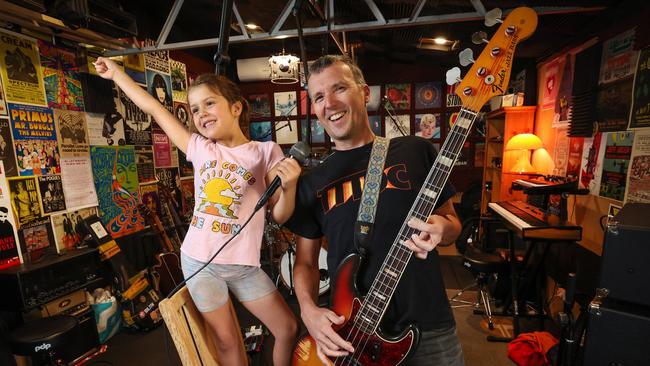Music becomes Australia’s go-to mental health coping strategy
This has become the nation’s go-to coping strategy, providing an unexpected lifeline during the pandemic and beyond.

Mental Health
Don't miss out on the headlines from Mental Health. Followed categories will be added to My News.
Steve Andrews has loved music from the time he sung his first Rolling Stones number in the school choir.
But it was only when picking up a bass guitar for the first time during Covid that music took on a new meaning for the Melbourne man.
”I’ve sung in a local band for years, but my connection to music was amplified during the
pandemic as my stress levels and mental health spiralled,” the 53-year-old said.
“I would dedicate an hour and a half a day to learning bass during the pandemic and it took my mind to a completely new space.
“You’ve got both a physical challenge with your fingers and a creative outlet.
“It couldn’t be a better escape.”
The managing director said as a naturally social person, the city’s strict lockdowns were particularly challenging.
But mastering the bass and song writing gave him a positive outlet, and helped steer him away from traps such as alcohol.
“I’m a happy, optimistic person but the stress of isolation certainly got me down,” Mr Andrews said.
“Like many people, I started drinking more … two bottles of wine a day sometimes.
“I think I might have stayed on that path, but I realised pretty quickly it wasn’t helping. “Playing bass was something positive to turn to.”
And Mr Andrews isn’t the only one — music has become the nation’s go-to coping strategy, providing an unexpected lifeline during the pandemic and beyond.
Research by News Corp’s Growth Distillery with Medibank has revealed that 36 per cent of Australians turn up the volume when times are tough — outranking even classic mood boosters like walking, driving or exercising.
Music therapy is also being used by registered practitioners to help people with serious mental health disorders as awareness grows of the benefits.
University of Melbourne’s Professor Katrina Skewes McFerran said research showed that music “lights up” many areas of our brain and can release so-called “feel good hormones”.
“Music is wonderful at triggering the reward systems in our brain, which then connects to motivation, engagement and activity,” Prof Skewes McFerran, from the Creative Arts and Music Therapy Research Unit, said.
“When people listen to music they love, it can also release oxytocin, which is the same neurotransmitter that’s associated with breastfeeding or making love.
“This is the gift of music.
“It’s about the personal associations with songs that people have built up over time and their memories and emotions.
“And best of all, it’s cheap and accessible.”
Medibank chief executive David David Koczkar said music was one of his key mindfulness techniques, and was instrumental during Melbourne’s Covid lockdowns.
He was caring for his parents and would regularly perform with his mother, a retired professional musician, playing cello while she plucked the harp.
“It was a way of connecting during that time … which was stressful for a lot of people,” he said.
“When we’d perform together, life just got a little bit easier.”
The Australian Music Therapy Association (AMTA) estimates about half of the nation’s 900 registered music therapists work with clients diagnosed with mental health conditions, alongside other treatments.
AMTA spokesman Dr Jason Kenner said it was helpful on a number of fronts, from giving people purpose and a creative outlet to helping manage anxiety and process trauma.
But music could also bring up painful memories, and it was important to take a case-by-case approach.
“We begin by understanding the client’s therapeutic goals, then consider their specific relationship with music, and commence work from there,” he said.
“It might be playing music together, or listening to a song and talking about what it means.
“There’s lots of supportive conversations along the way so it’s not just the music, it’s also a counselling session.”
James Randall, 39, of Geelong, has been working with a music therapist for four years and said it had been life-changing.
Mr Randall enjoys songwriting, rap, keyboard, and mixing and mastering, and has set up a YouTube channel Heavenly Poet.
“Music therapy is very powerful, and can help a lot of different people in different areas of their lives,” he said.
“So for me, it’s been a big key to being successful being whole and healed and healthy and happy.
“I have good days and bad days, but we all do, I guess, and my diagnoses don’t run my life now.”
For Mr Andrews, music was also a way to bond with his daughter, Marla, 6, who shares his love of singing.
Even now, retreating to his garage that’s been converted into a band room is a release from the daily pressures of work and life.
“The other day I went and played bass after dinner, after a particularly stressful day at work,” Mr Andrews, who plays in the bands Fungoose and Vaguerant, said.
“Within 45 minutes my spirits had completely lifted.
“It has an enormous bearing on my joy of life now.”
Can We Talk? is a News Corp awareness campaign, in partnership with Medibank, helping Australian families better tackle mental wellbeing. To follow the series and access all stories, tips and advice, visit our new Health section.
Originally published as Music becomes Australia’s go-to mental health coping strategy



